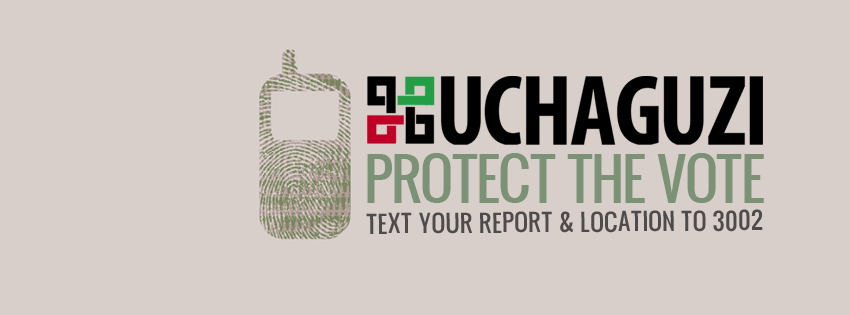
The following is an full example of using Ushahidi toolkits to document a large community project. While is was the largest of all our Community Events so far, the extensive documentation stands a Use Case for how document and execute a successful project.
Kenya held holding elections on March 4, 2013. We used Ushahidi software for the Uchaguzi project. The goals were to: share the information from the crowd, verify details and respond. We give voice and amplify issues by describing and mapping reports.

Uchaguzi is an Ushahidi deployment to monitor the Kenyan general election on March 4th 2013. The Uchaguzi project aims to contribute to stability in Kenya, by increasing transparency and accountability through active citizen participation in the electoral cycles. Rather than introducing a new concept or organisation, the project seeks to leverage on existing (traditional) activities around electoral observation, such as those carried out by the Elections Observer Group (ELOG) in Kenya. Uchaguzi will assist in the creation of a more rapid reporting and alert system in traditional electoral monitoring, as well as bring in the voice of citizens as a new dimension in electoral monitoring through crowd sourcing of data.
Kenya will hold its first election since the new constitution. Ushahidi started with the post-election violence in 2008. Since that time, we have deployed for the Ushahidi post-election violence in 2008 and the 2010 Kenya Constitution. Last fall, the Standby Task Force collaborated with the Ushahidi team as a simulation for 4 constituency elections.
Ushahidi has build partnerships with local civil society organizations, official NGOs, governments and PACT (local election monitoring groups.). We will be launching for the Kenya elections. There is expected troubles.
We also have a number of unofficial partners.
Crowd: the main focus of Uchaguzi and the source of most of the reports. We want people to send us any information on the election/electoral process that they feel is significant
Verification: the process through which Uchaguzi evaluates information and determines how credible it is
Response: Getting verified information to organizations and individuals who can intervene positively and monitoring that response to measure its effectiveness.
The Uchaguzi project is being lead by Daudi Were. You can reach him via dwere@ushahidi.com.
Note: Daudi Were has hosted Partner trainings with the CRECO and Peacenet communities. These are outside the general Community Trainings. Partner members will also be joining our community training sessions.
NOTE: over 200 folks have been trained globally and locally so far.
Uchaguzi Ushahidi will be a large local and global community project. There are a number of ways to get involved.
1. Join the local Kenya-based Working Groups. About these teams: Uchaguzi Community Working Groups
2. Join the Online Digital Response Teams. About these teams: Uchaguzi Digital Teams